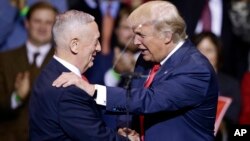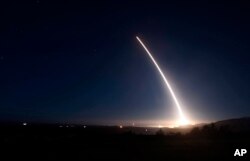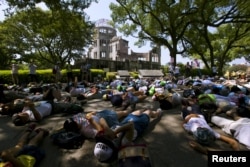The United Nations begins negotiations Monday on a legally binding treaty to prohibit nuclear weapons.
This comes as the United States commences a review of what role its nuclear weapons should now play.
“Shortly after taking office, the president directed a new Nuclear Posture Review to ensure that the United States nuclear deterrent is modern, robust, flexible, resilient, ready, and appropriately tailored to deter 21st century threats and reassure our allies,” White House senior assistant press secretary Michael Short told VOA Friday. “The review is underway and is being led by the secretary of defense.”
Those around the world yearning for a planet free of nuclear weapons are likely to be disappointed with the outcomes both at the United Nations and the White House.
“I personally support a world without nuclear weapons,” said Steven Pifer, a former U.S. deputy assistant secretary of state for European and Eurasian affairs. “But I would also admit it would be very hard to get there.”
NATO vote
The Obama administration last year strongly encouraged NATO allies to vote against the start of negotiations at the U.N., contending such a ban would hinder cooperation to respond to nuclear threats from adversaries.
The proposed U.N. treaty “aims to delegitimize the concept of nuclear deterrence upon which many U.S. allies and partners depend,” according to a notice Washington sent to NATO on October 17.
Some in the Trump administration would like to see it abandon Obama’s stated goal of a world without nuclear weapons and lift the moratorium on U.S nuclear weapons testing.
“We have not conducted an experiment in over 20 years. Since then we’ve made some changes to our nuclear warheads, and we don’t fully understand how those changes might play out in operational scenarios,” said Michaela Dodge, a senior policy analyst at the Heritage Foundation.
Examining whether global nuclear disarmament “is a realistic goal” is part of the Nuclear Posture Review, according to Christopher Ford, the National Security Council’s senior director for weapons of mass destruction and counter-proliferation, who spoke at a conference in Washington last Tuesday.
The Trump administration “may come to a different conclusion than the Obama administration came to as to how realistic it is to make that a goal that drives your near and midterm policy approaches,” Pifer, director of the Brookings Arms Control Initiative, said during a seminar the following day devoted to how U.S. and Russian leaders can avoid renewed nuclear tensions.
Number of weapons
Also on the table, according to National Security Council officials, are the number of U.S. weapons needed to counter other nuclear-armed countries and whether new devices should be added to its atomic arsenal.
“I think over time President Trump and his team at the Pentagon are going to recognize that we do need to continue to have verifiable arms limits with Russia,” said Pifer, also a former U.S. ambassador to Ukraine. “We don’t want a new arms race. We don’t want to open the door to new types of nuclear weapons and nuclear testing, which would have grave ramifications for the global arms reduction and nonproliferation process.”
That also appears to be the view in Moscow.
A former Russian arms control negotiator, who attended the Washington seminar told VOA the Kremlin desires resuming dialogue in this arena.
“For the Russian side, if United States is forthcoming and comes up with something interesting, it would be very difficult for Russia to say, ‘Nyet, we’re not interested.’ No. No way,” said Victor Mizin, deputy director of the Institute for International Studies at the Moscow State Institute of International Affairs.
The self-described former Cold Warrior terms the current situation as a “hybrid cold war,” contending the rhetoric is worse than it was in the 1980s.
For the past several years, the United States has accused Russia of violating the Intermediate-Range Nuclear Forces Treaty, a landmark arms control agreement of the Cold War.
Ford, the only senior nuclear policy official yet appointed by Trump, said the administration is reviewing responses to Russia’s deployment of nuclear-capable cruise missiles, which led to the U.S. accusations.
“What usually happens, as you well know, is the United States over-complies with agreements while permitting Russia to have more wiggle room in an effort to save the agreement itself,” Dodge, at the Heritage Foundation, told VOA.
Arms control
Another influential Russian academic visiting Washington in recent days for conferences and seminars on arms control, Sergey Rogov, expressed concern about the Trump administration’s apparent distaste for multilateral treaties, noting contradictory comments made by candidate Trump on nuclear issues.
“Apparently today there is no nuclear policy for the new administration,” said Rogov, director of the Institute of U.S.-Canadian Studies of the Russian Academy of Sciences, who added, however, “it’s still early. But the problem is the Republican Party has almost no arms controllers left.”
President Trump, on the campaign trail, did speak both of a desire to see the abolition of nuclear weapons and of giving an unrivaled arsenal to the United States, which he said had fallen behind in its nuclear capabilities.
The president also mentioned the possibility of using nuclear weapons against the Islamic State and publicly pondered whether countries such as Japan and South Korea, protected under the American nuclear umbrella, might be better off having their own such weapons.
The U.S. nuclear posture review is expected to take 12 to 18 months. The previous one was completed in 2010 during the first term of President Barack Obama.
U.S. nuclear policymakers will now also be keeping one eye on the activities at the United Nations where the negotiations threaten to upset the terms of the Nuclear Non-Proliferation Treaty. That treaty allowed the United States, Russia, China, United Kingdom and France, who are also the five permanent members of the U.N. Security Council, to retain their nuclear weapons for an unspecified time.
Anti-nuclear activists
Some anti-nuclear activists expressed disappointed with the Obama administration, despite its denuclearization rhetoric, because it requested large increases for nuclear weapons programs at the Department of Defense and the Department of Energy. They are not expecting good news from the Trump administration.
“But throwing out even this rhetorical commitment, arguing that a world without nuclear weapons is unrealistic, and hinting at the resumption of explosive nuclear weapon testing means violating international law, including the Non-Proliferation Treaty and the Comprehensive Test Ban Treaty, and a clear expression of support for nuclear weapons,” said Ray Acheson, director of the disarmament program of the Women’s International League for Peace and Freedom.
Acheson told VOA her organization sees this as “posing enormous risks to the existing nonproliferation regime” and “will essentially be equivalent to throwing the last several decades of iterative work towards nuclear disarmament and nonproliferation into the dustbin of history.”









